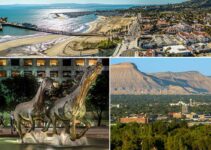Have you ever wondered who decides what gets built in your neighborhood—and how those structures will look and function? And why are there certain types of businesses in one area and homes or parks in another? Zoning and Planning professionals comprise a group of people with power to determine the future vision of your community and make policy recommendations about its development. In this article, we offer the insights of one of those professionals whose work is making an impact in one central Vermont community.

This issue’s featured planner
Andrew Strniste
Planning & Zoning Administrator
City of Rutland, VT
How long have you been the Planning and Zoning Administrator for the City of Rutland, VT?
I’ve been with the City of Rutland for three years. Prior to my time in Rutland, I was the Planning and Zoning Administrator for the Town of Underhill, VT, for about four and a half years. So, in total I’ve been in the field for about seven and a half years.
You have the combined roles of a planner and a zoning administrator. Could you describe how that works?
In a lot of municipalities in the State of Vermont, having one person perform both roles is common. The Zoning Administrator is responsible for approving permits and making sure that whatever project is being proposed conforms with the municipality’s zoning regulations. The overall objective of a planner is really trying to ensure that the city or the municipality grows and achieves the goals and objectives of its residents and elected officials. Until recently, prior to hiring an Assistant Zoning Administrator, I was handling both planning and zoning for the City of Rutland.
What are some backgrounds or related fields someone in your position might come from?
I have a background in regional planning and environmental science. Other related backgrounds that you see in the field are landscape architecture and urban studies; however, the main fields are likely regional planning, urban planning, or town planning.
Who are some of the main stakeholders you deal with in your role?
I work with the public on an ongoing basis. I’m regularly answering phone calls and inquiries about development projects, so residents are a big stakeholder. I also work with developers and prospective developers, who are looking to maybe do a major project and are looking to see what’s feasible, and what’s not feasible.
I work with the banking industry, real estate agents, and attorneys who are trying to make sure that whatever is on the site actually is either permitted or allowed. Then there are municipal representatives from the Board, as well as the mayor. For example, in Rutland City when the mayor is promoting development, he needs to have a good idea of what’s allowed under the zoning regulations. He and the Board also help set policy from a planning perspective.
I also work closely with counterparts within my department, including the building Inspectors, office coordinator and the Department of Public Works in regard to water and sewer. Sometimes working with State and Federal agencies is also necessary.
How has GIS mapping helped you be more efficient in your job?
It’s really allowed us to integrate our assessing information with parcel information. So just in terms of people reaching out to us with questions, it’s really cut back on those solicitations. Now, you can just go to the website and get that information right there. In the past, each inquiry was probably a 5-to-10-minute process, so it’s probably as much as an hour’s worth of time that we’re getting back in a day.
Do you use any other technology to help improve your efficiency?
Yes, we have a third-party software company that allows us to internally look up a parcel and see all the permits on that parcel. It’s sort of a one-stop shop for seeing what’s going on with the property as far as permits, etc.
How have world events and a changing environment affected your work?
I think events like COVID-19 have changed everyone’s interaction with the world. Before COVID there was a lot of dependency on coming to the municipality to obtain property information. It wasn’t readily available online. Since I came on board, I’ve been making strides to try to get [property and zoning information] online and available to the public. So should [something like COVID] ever happen again or some sort of situation or circumstance comes about where the municipality has to shut down, that information will still be available for people to use.
How are you working to deal with issues like climate change?
With unfolding, potential environmental issues such as climate change and increased flooding, I’ll be looking to shift more into the realm of planning, which should address some of those issues. Right now, addressing fossil fuels in a rural, workforce- heavy state like Vermont is a little bit tough because there’s so much dependency on gas powered cars. Thus, the transition to electric cars has been slow. There’s still the need for a lot of heavy industrial/heavy equipment that doesn’t work well with electric energy. So, there’s still a lot to be done. In my opinion, for Vermont to really start taking advantage of all the opportunities out there with electric cars, we need to see more gains.
How do you see the future of planning and zoning and your role?
In my opinion, you’re seeing more communities taking on planners and trying to help municipalities plan for the future. It’s a field that’s ever growing. To some degree planning still feels like it’s in its infancy, especially in rural communities. I think parties are starting to appreciate the importance of planners, but it’s still a little bit of an abstract field that not everyone has bought into. So, I think that’s where we have room to grow.
I’m probably biased since I’m a planner, but I do think it’s I think it’s an important field and an important position to have in municipalities because it’s more than just about the strategic planning of a municipality. It can really help alleviate social justice issues; making sure you have equitable planning and not targeting one area just because it’s not affluent, underserved, or underprivileged. With proper planning, you can make sure that we’re being fair to the entire community rather than catering to one segment of the population.
I think the zoning field will keep “chugging” along. It’s going to be there for as long as a municipality wants zoning regulations. And the more robust those zoning regulations are, the more zoning administrators you may need. Whereas with planning, I think there’s still a lot of room to grow in a lot of areas of the country.
What advice would you give someone who might be interested in working in the planning or zoning field?
I would definitely recommend attending your local planning commission meetings. That’s where you really start to get familiar with the planning and zoning concepts and the work being done with them. I’d also recommend talking directly with a member of the planning commission or planning staff. Getting exposed to the field while in school is now more of a possibility. When I attended Westfield State University, I believe it was one of State schools in New England to offer a planning-related degree. Today, I suspect more colleges and universities are offering specialized degrees in urban planning and related fields, so that has been a huge help for those looking to get into the planning and zoning field.


